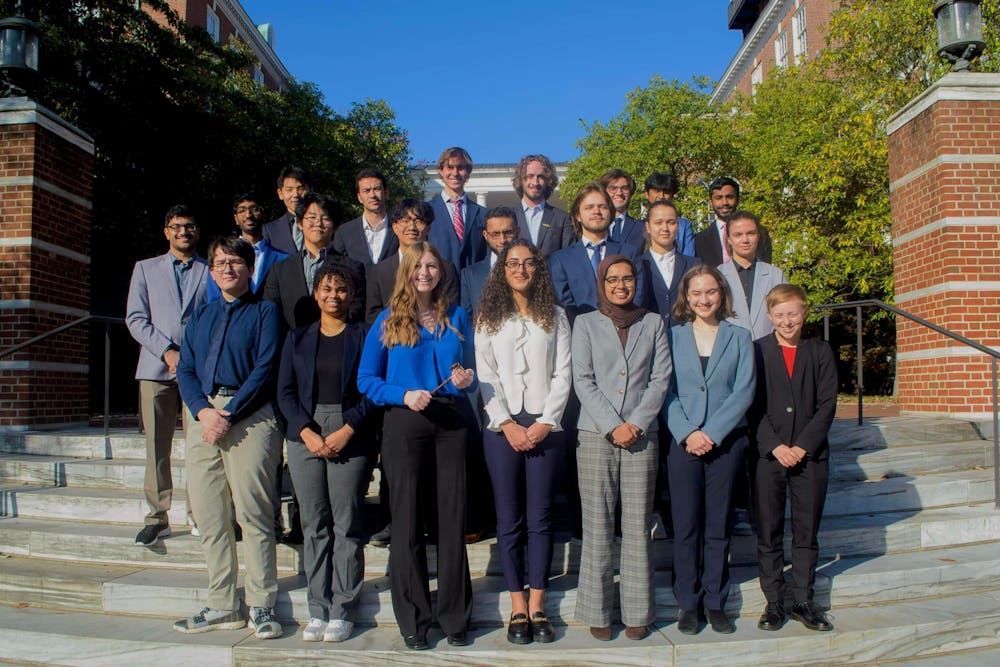The University’s Model United Nations (UN) team, HopMUN, gives undergraduate students the opportunity to travel across the country to participate in simulated Model UN conferences. The organization aims to develop members' public speaking and writing skills while educating them about public policy and coalition-building.
In an interview with The News-Letter, Treasurer and Director General Achyuth Parola explained the purpose of Model UN conferences, stating that Model UN is one of three titular forms of debate: mock trial, classical and Model UN. He stated that Model UN is unique in that it is a collaborative debate, where opponents compete by trying to gain consensus.
President Saahith Potluri described his perspective on the benefits of Model UN in an interview with The News-Letter.
“[Model UN] goes a little further than debate, because not only do you need to be smart about how to write and how to make an argument and what different policies and legislative things mean, but you also have to have people skills,” he said. “You need to learn how to unify a room with 100 different people.”
To help members gain the skills to succeed at conferences, HopMUN facilitates four training sessions with newly recruited members. In an interview with The News-Letter, Training Director Tyler Han discussed this training process.
“One of the most important parts of Model UN is just doing it. It's kind of like riding a bike: You can hear all these things about how to ride a bike, but you don't actually know how to ride a bike until you actually get on it and start practicing,” he said. “Our curriculum is really good because it gives everyone the basic skills, and then we give people the opportunity to practice those skills within our practices.”
In an interview with The News-Letter, Vice President Galilee Best stressed that HopMUN is unique from other Model UN teams in that they do not require that members win competitions in order to travel for conferences. She added that the club is proud to be able to allow members to travel no matter their financial status.
Aside from developing members’ debate skills, HopMUN provides a welcoming social environment. The organization hosts frequent social events and also has “bigs” and “littles,” an opportunity for more experienced members to match with new members to provide mentorship.
Potluri discussed how HopMUN maintains its positive social environment.
“Our club is as diverse as [it] could be,” he said. “You can have any sort of background and have done anything at college and still be able to be a part of [HopMUN]. That’s something that’s great about this club, and we pride ourselves on having a really active social scene.”
Potluri recounted being quiet in high school and credited his experiences with public speaking and debate in HopMUN for developing his social skills. Parola also discussed similarly positive developments from his time in the organization.
“Joining the Model UN team was the single best decision I made after coming to Hopkins,” Parola said. “It's provided me [with] a bounty of wonderful social experiences and wonderful places to build skills that I want. [It’s a] wonderful place to refine myself as a person.”
As a student majoring in Neuroscience, Potluri added that Model UN is a multidisciplinary activity that can be helpful to students of any discipline or interest.
“A lot of people — especially in my experience mentoring underclassmen at Hopkins — have trouble with public speaking. If you’re involved in research or any other type of academia, [public speaking] is an important skill to have,” he said. “Not only does Model UN keep us informed about the world and help us stay up to date with current events, but it also gives us those soft skills that are essential no matter what you study.”
Model UN provides students with the opportunity to meet students within the Hopkins community as well as to connect with students across North America. The organization participates in conferences in Montreal, Boston, Chicago and Washington, D.C.
Best noted that the diversity within Model UN, both in terms of academic backgrounds and racial and class backgrounds, has allowed her to develop professionally.
“Being able to understand where [people are] coming from, or at least take a moment to pause, listen and then reflect or react, has been a really important skill that I also feel has helped me in my professional development,” she said. “My knee-jerk reaction now isn't necessarily to defend, but instead it's to listen, to understand and then to comment.”
In an interview with The News-Letter, freshman Sareen Muthyala reflected on his experience joining the HopMUN team.
“After three training sessions, we got to meet all the returning members, and that's when I think it started to feel like a family, in a way,” he said. “Right from the jump, HopMUN was one of the most inclusive and fun clubs out there.”
Muthyala expressed appreciation for HopMUN’s ability to simultaneously take training and competitions seriously while maintaining a close-knit and friendly community. He added that the club’s leadership has helped make balancing HopMUN with other academic commitments easy.
Best added that HopMUN has been working to improve its social culture for the past few years.
“Since three years ago, [HopMUN] has been making an avid push to change the culture to make it more friendly, to make it less about necessarily winning all the time and to make it seem less elitist,” they said. “I'm very proud to say that the people we have… have really pushed that diversity, pushed that sense of inclusion, but also pushed that sense of representation.”
Shirlene John contributed to the reporting of this article.

















